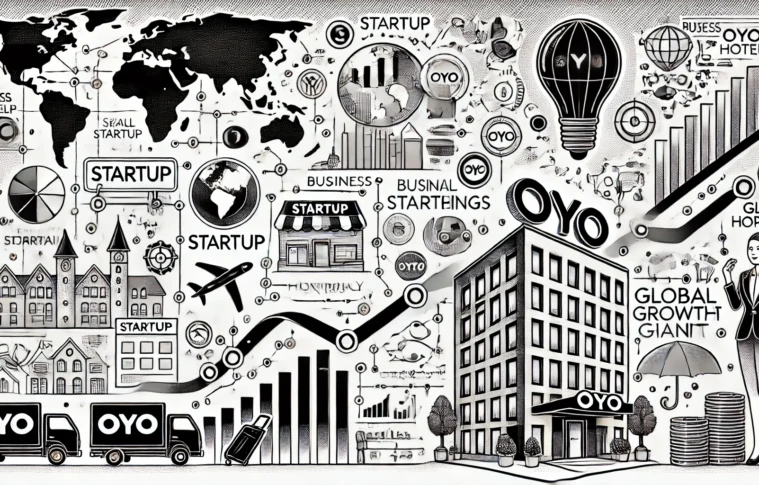OYO, one of the most successful startups to emerge from India, has revolutionized the hospitality and hospitality technology space. Founded in 2013 by Ritesh Agarwal, OYO’s journey reflects innovation, market adaptability, and strategic growth in addressing challenges in the hospitality industry. From a single property in India to becoming a global hotel chain with millions of rooms in dozens of countries, OYO’s story offers a compelling case study in entrepreneurship and disruption.
The Birth of OYO
Founder: Ritesh Agarwal
Founded in: 2013
Headquarters: Gurugram, India
Industry: Hospitality Technology & Accommodation
The idea of OYO (On Your Own) was born when Ritesh Agarwal noticed a significant problem in the hospitality space. Travelers frequently faced inconsistent experiences due to unbranded, unstandardized, and unregulated small hotels. Ritesh envisioned creating a solution that would standardize budget hotel experiences, providing consistency, affordability, and reliability to travelers.
The initial concept was simple: streamline the experience for budget travelers by partnering with small hotels, standardizing their services, and branding them under the OYO umbrella.
OYO’s Business Model
OYO’s business model disrupted the traditional hospitality industry by introducing innovative strategies. Here’s how OYO operates:
- Asset-Light Model:
Unlike traditional hotel chains that invest heavily in property development, OYO operates an asset-light model. It partners with existing small hotels and integrates them into its network, providing technology and branding rather than directly managing ownership. - Standardization & Branding:
OYO partners with independent small and budget hotel owners, standardizing their amenities, pricing, and services to offer a uniform experience for travelers. This consistency allows OYO to provide a familiar, reliable experience for guests. - Technology-Driven Operations:
OYO utilizes technology to streamline operations, manage bookings, optimize pricing, and improve the overall customer experience. From its mobile application to online booking platforms, OYO relies heavily on technological innovations. - Dynamic Pricing:
The use of advanced AI and machine learning helps OYO determine optimal pricing for its partner properties based on demand, availability, and market trends. - Global Reach through Partnerships:
OYO’s strategy relies on expanding its presence by partnering with hotels across regions. These partnerships allow OYO to scale rapidly without heavy capital expenditure.
Key Milestones in OYO’s Journey
OYO’s journey is marked by key milestones that paved the way for its rise to international prominence:
1. Establishment in 2013:
Ritesh Agarwal founded OYO in 2013 with a single hotel in his hometown of Raipur, India. His vision was simple: to offer affordable, consistent, and standardized accommodations to budget travelers.
2. First Funding and Initial Expansion:
OYO raised its first round of funding from hospitality-focused venture capitalists, allowing it to scale its initial operations in India and expand its services to other Indian cities.
3. Entering the International Market:
In 2015, OYO expanded outside India into international markets, beginning its journey to become a global hospitality giant. It established operations in Southeast Asia, China, and other emerging markets.
4. Entry into China & Strategic Expansion:
OYO entered the Chinese market in 2018 and quickly became one of the largest hotel chains in the country. China remains one of OYO’s key markets, thanks to its focus on rapid expansion and partnerships with local hotel operators.
5. Strategic Funding Rounds:
OYO raised millions in venture capital from global investors such as SoftBank Vision Fund, Sequoia Capital, and other international funds. These funding rounds supported its global expansion, technology development, and operational scale-up.
6. The Acquisition of Strategic Assets:
As part of its growth strategy, OYO has made acquisitions in technology and services to integrate complementary features into its ecosystem, improving operational capabilities and customer experiences.
7. Global Footprint:
OYO has now expanded its presence to over 80+ countries, with partnerships with more than 43,000+ hotels globally. From Southeast Asia to Europe, North America, and the Middle East, OYO has expanded its services across diverse markets.
Challenges OYO Faced
Like most startups on their journey to scale, OYO has faced several challenges along the way. These challenges have tested its business model and adaptability:
- Regulatory Hurdles:
Operating in multiple countries exposed OYO to varying regulatory environments, requiring careful navigation of local laws and standards. - Partner Conflicts:
Partnering with independent hotels created issues related to maintaining uniform standards and ensuring quality across its network. - Financial Sustainability:
OYO relied heavily on venture capital funding during its initial years, which raised concerns about its profitability in the long term. - Competition from Established Players:
As a disruptor, OYO faced stiff competition from both traditional hotel chains and other emerging hospitality startups. - Technology & Scalability:
Rapid technological innovation and market expansion demanded constant upgrades to OYO’s AI and booking systems, making scalability a challenge.
Despite these hurdles, OYO’s ability to remain flexible, innovative, and strategic allowed it to overcome many of these obstacles.
The Success Formula of OYO
What made OYO successful? The company relied on a mix of innovation, strategy, and adaptability.
1. Emphasis on Technology:
OYO has heavily invested in technology to ensure efficiency, scalability, and seamless customer experiences. Its AI-driven pricing models, streamlined booking platforms, and innovative supply chain management helped OYO stand out.
2. Asset-Light Model:
By partnering with independent hotels rather than investing in real estate, OYO scaled its operations without incurring the risks of direct hotel ownership.
3. Strategic Funding:
OYO leveraged funding from international venture capitalists like SoftBank Vision Fund, which empowered the company to scale quickly in competitive global markets.
4. Fast Global Expansion:
OYO’s strategy of entering diverse international markets allowed it to tap into a variety of customer bases. Through partnerships with local players, it achieved faster growth in markets like China, Southeast Asia, and Europe.
5. Flexible Business Strategies:
OYO’s flexibility allowed it to adjust its business model based on market feedback, technological developments, and consumer demands.
Impact of OYO’s Vision
OYO’s success has had a transformative impact on the global hospitality and technology industries:
- Democratization of Travel:
With affordable, standardized, and tech-enabled options, OYO made budget travel more accessible to millions of people. - Employment Opportunities:
OYO has generated thousands of jobs worldwide by partnering with local hotel operators and building technology teams. - Hospitality Innovation:
OYO has demonstrated how technology and innovation can solve legacy issues like inconsistent hotel standards, pricing optimization, and operational inefficiencies.
Conclusion: The OYO Legacy
The journey of OYO is a classic example of how innovative ideas, strategic planning, and technology can disrupt traditional industries. Founded on the vision of affordable and reliable accommodations for travelers worldwide, OYO has grown from a single hotel in Raipur to one of the largest hospitality networks globally.
Ritesh Agarwal’s leadership, combined with technological innovation and smart partnerships, has allowed OYO to scale its operations across 80+ countries, with tens of thousands of rooms under its brand.
OYO’s journey teaches aspiring startups the importance of market research, technology adoption, strategic funding, and flexibility. As OYO continues to scale and evolve, its story will remain a case study in entrepreneurship and the power of innovation in a competitive market.
The OYO story inspires every aspiring entrepreneur to dream big, innovate consistently, and scale with resilience and vision.
Disclaimer
Posts in the Notebook are written by individual members and reflect personal insights or opinions. Please verify any information independently. If you have any concerns, notify the admin immediately so we can take action before any legal steps are taken.





